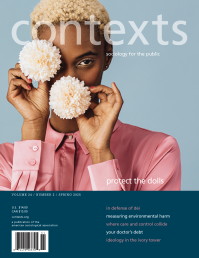Sex and Coronavirus
In March 2020, a joke made the rounds on the Interweb as more and more U.S. workplaces, schools, and other social institutions asked people to sequester themselves at home in order to reduce the transmission of COVID-19. Q: What do you get nine months after a national quarantine? A: Maternity wards full of newborns named Corona and Fauci.
The joke pivots on the assumption that adults who suddenly find themselves stuck at home with nothing much to do will eventually wind up having sex. Lots of sex. And, as everyone knows, one potential result of a certain kind of sex, between certain kinds of partners, is babies.
There is, in fact, some evidence of small, localized baby booms ensuing roughly nine months after major storms and electric blackouts, suggesting temporary confinement—or boredom— inspired spikes in sexual activity. (See, for example, economists Richard W. Evans, Yingyao Hu, and Zhong Zhao’s study of U.S. fertility after major hurricanes, in the Journal of Population Economics; but also see sociologist J. Richard Udry’s myth-busting analysis of the 1965 New York City blackout, in Demography.)

However, what happens if the blackout or equivalent lasts for months or even years on end? What if it involves more rather than less recourse to web-connected technology? What if there’s a potentially lethal infectious disease in the mix? (Notably, COVID-19 requires far less physical contact to spread than do the infections we call sexually-transmitted.)
Suffice to say, human sexual relationships are one of myriad aspects of social life that have been affected by our coronavirus-inspired regime of “social distancing.” When U.S. Americans first began to hunker down, a number of questions sprang to mind: Will self-seclusion on a massive scale enhance or diminish people’s sex lives? Will they have more or less sex? Better or worse sex? Felicitous or potentially injurious sex? Whose sexual beliefs and behaviors will change and whose will not, and why? Looking beyond consensual sex in non-abusive relationships (which is my focus here), in what ways will social distancing affect sexual assault and intimate partner violence? What about people who rely on income from sex work to live?
As the pandemic wore on, I sorrowed for young people denied the chance to lose their virginity (however they define it) after the high school prom, or to savor a first kiss at summer camp. I also began to wonder about longer-term consequences. What new scripts are emerging to guide sexual conduct? At what point does the temporary aberration of “sex during COVID” turn into a fundamental restructuring of sexual life? When does how people date in a pandemic become, simply, how people date? What happens to people’s sex lives when, already worn down by the negative health, social, and economic consequences of a pandemic, they also must confront anti-Black violence, anti-immigrant sentiment, and environmental destruction?
How social distancing will reshape sexual life depends, in part, on how, and especially with whom, people live, as well as on their life stage. Even as many of us—particularly liberals, older people, and those whose class positions allow them to work remotely—are distancing ourselves from most other humans (our weak ties), we are increasing our daily contact with the people we live with (our strongest ties). People who share a residence with their sexual partner or partners face the fewest impediments to continuing their sex lives as usual. (Of course, scholars of asexuality would remind us, as Kristina Gupta does in Signs, that not everyone—not even everyone with a romantic partner—is interested in sex.)

Some cohabiting couples and polyamorous domestic groups may have managed to turn covid-inspired seclusion into a second honeymoon of sorts. However, evidence so far suggests that everyone, regardless of their residential situation, is having less sex than before. (See, for example, Tara McKay and colleagues’ forthcoming research on covid and gay and bisexual U.S. men.) Why should this be? For one thing, stress tamps down many people’s sexual response even as it ramps up others’ (see psychologist Emily Nagoski’s Come as You Are). Familiarity presents a different pitfall. Partners have less sex the longer they are together, though why is complicated. People get bored, sure. Social scientists call this habitu-ation. However, people also have lots of everyday responsibilities, which they may minimize early in relationships (see sociologist Virginia Rutter’s overview in Psychology Today). It remains to be seen how our libidos will be affected by months of skipping showers and watching our partners take Zoom meetings in their sweatpants. Finding what feels like sufficient privacy and space to engage in enjoyable sexual activity may be tricky for folks who share their residence with others, especially school-age children.
The circumstances of young adults sent home from residential colleges and universities has proven challenging for parents and offspring alike. Both generations are accustomed to more privacy and independence than quarantine affords. Even though residential colleges aren’t quite the factories of fornication depicted in popular media, college students are used to charting their own sexual course. Many families have needed to decide whether to retain or renegotiate pre-college parietal house rules.
Things are different still for people who don’t share an abode with a sexual partner, a contextual factor made all the more relevant given rising numbers of people living alone in the United States and other wealthy countries. Previously platonic housemates may well become friends-with-(sexual) benefits, given a felicitous combination of sexual orientations. They would do well to communicate clear expectations beforehand. That’s good advice for all sexual relationships, in any event.
As the pandemic persists, asking adults and teenagers without partners to adhere to the strictest social distancing guidelines is unrealistic; it could be tantamount to asking them to remain single or celibate for years. So we must ask how people are having sex with new partners and whether concerns about COVID are informing their interactions. How can people who enjoy sex with casual partners continue to do so safely? We must endeavor to harness the many lessons we’ve learned about the social side of sexually transmitted epidemics.
Some readers may be grumbling: Isn’t sexual activity a trivial concern when people are losing their jobs, their freedom of movement, even their lives? These are vitally important issues, no doubt. However, the sexual effects of the pandemic are serious, too. Sex is a cherished part of many people’s lives; it makes them happy. There’s also evidence that an active sex life is good for mental and physical health, relationship satisfaction, and sound sleep. Moreover, as Audre Lorde, Darnell L. Moore, and other Black queer thinkers have observed, sex and intimacy can play a central role in fighting racist, sexist, homophobic oppression. When social institutions don’t care if people like you live or die, loving such people—and yourself—amounts to a revolutionary act.
So let’s strive to sustain our sex lives, in all their diversity, in ways that reward and comfort us. If you reside with your partner(s), it may be time to get creative and try “those things” you’ve always meant to. If you don’t reside with a partner, you’ve got multiple options, including phone sex (how retro!), sexting (with permission), and camming. If you don’t have a regular partner, enjoy flirting online plus any of the above, not to mention masturbation. Practice good hygiene with sex toys and take care about your privacy. In this context, safer sex means a secure Internet connection and password protection. When political leaders ask you to risk your health to preserve corporate profits, consider instead what risks you might accept to foster human connection and community, including sexual activity. Most of all, be patient and understanding and don’t give up on intimate pleasure in times of stress and trouble.
